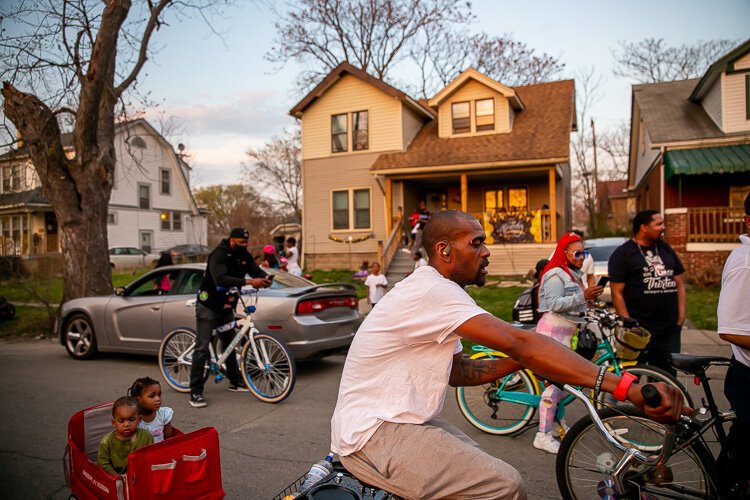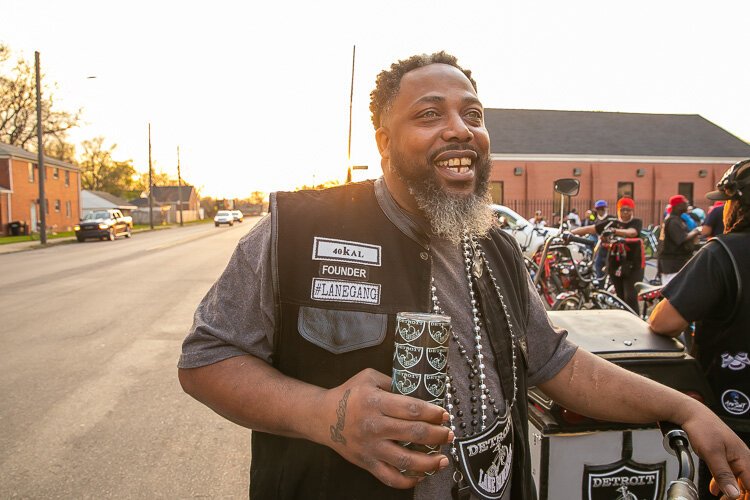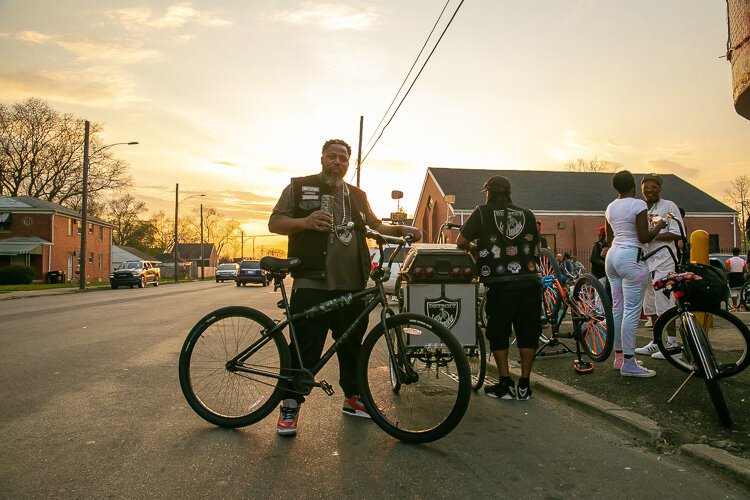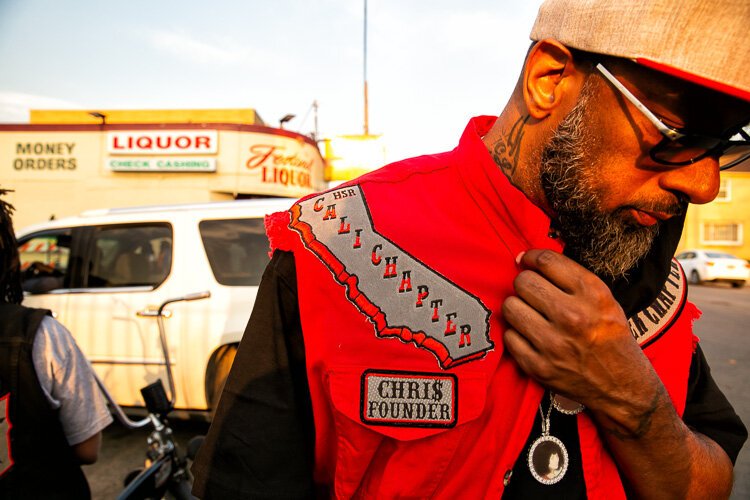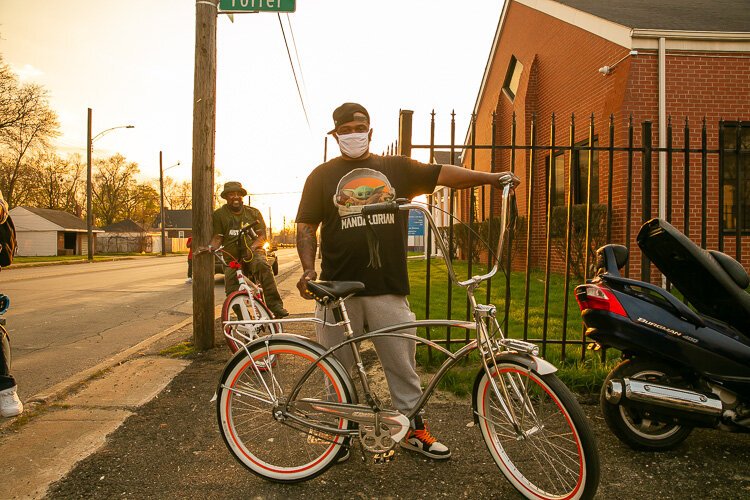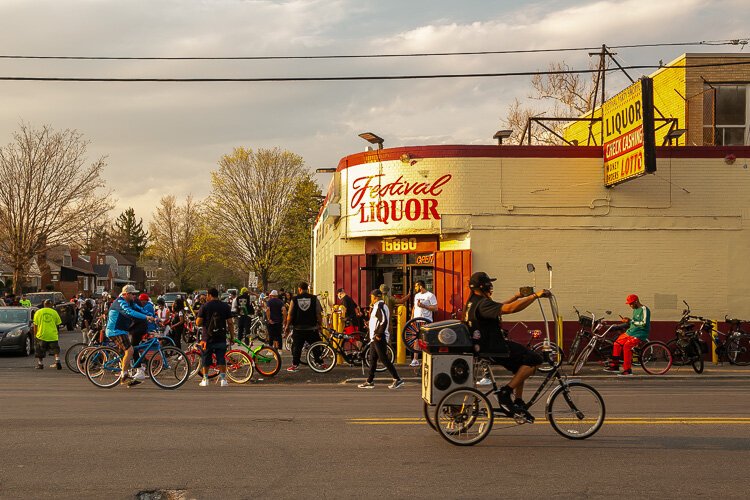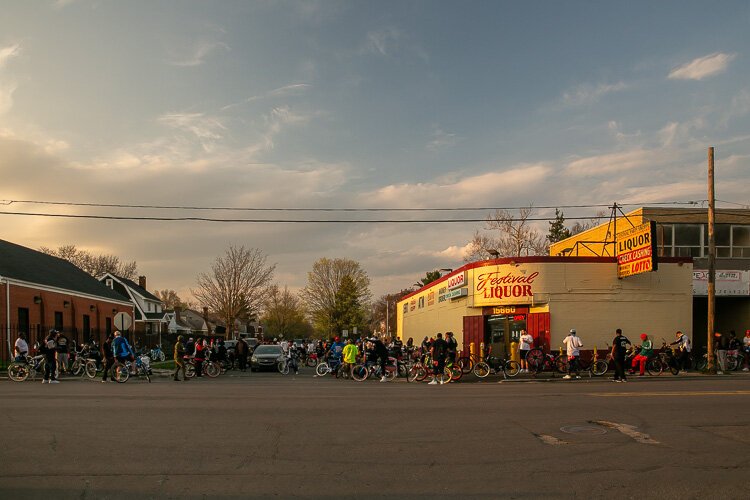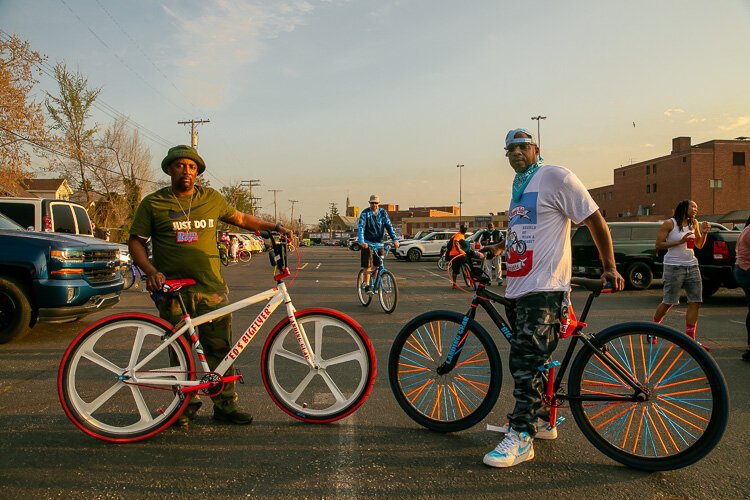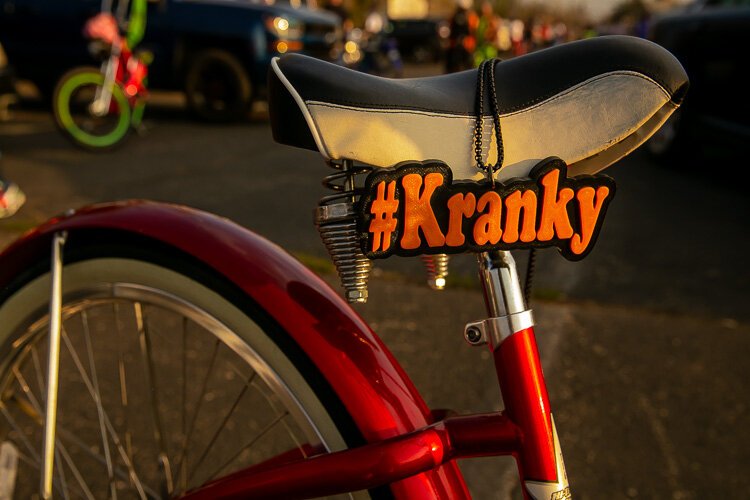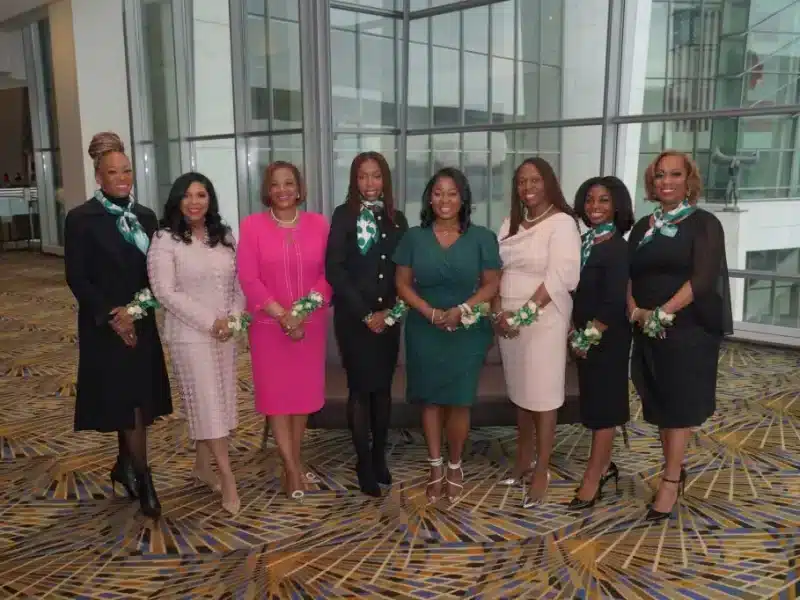On bicycle clubs and the social fabric of Detroit life
As more Detroiters get vaccinated (and temperatures are expected to start hitting the 90-degree mark as early as this week), bike season is kicking off again, this time with more interested bikers, and a renewed purpose of having fun and supporting communities that have endured so much in the past year.
The first bike clubs appeared in Detroit in 1879. According to Todd Scott of the Detroit Greenways Coalition, the clubs set up a structure similar to the army inspired by the newly-won Civil War. Complete with uniforms, a hierarchy of officers, and a bugle to start their rides, the first bike clubs were social gatherings, and eventually, they became support systems for members and communities through challenges like the Influenza Epidemic of 1918 and The Great Depression.
According to research by the nonprofit People for Bikes, one in 10 American adults rode a bike for the first time in a year or more during the COVID-19 pandemic. The organization believes that the reason behind renewed interest in biking was good old-fashioned boredom and free time.
Whatever the reason, the phenomenon hit metro Detroit too. When shoppers made a run to stock up on toilet paper and water at the start of the pandemic, bikes sold out across the metro area as well. Local bike shops also saw sales soar. Zak Pashak, president of Detroit Bikes, told Model D last year that sales for April were up 644% over April of last year. Online sales were up 1,112% for the month. “We basically sold out of everything we have,” he said at the time.
While there are more bike riders on America’s roads, Detroit already had a rich bike club culture, but like most things, the pandemic definitely interrupted their regular schedules.
Bike ride schedules and virtual meetings weren’t all that was lost during the height of the pandemic, which has killed more than 2,000 Detroiters to date, at least four members of area bike clubs have died from the coronavirus.
As more Detroiters get vaccinated (and temperatures are expected to start hitting the 90-degree mark as early as this week), bike season is kicking off again, this time with more interested bikers, and a renewed purpose of having fun and supporting communities that have endured so much in the past year.
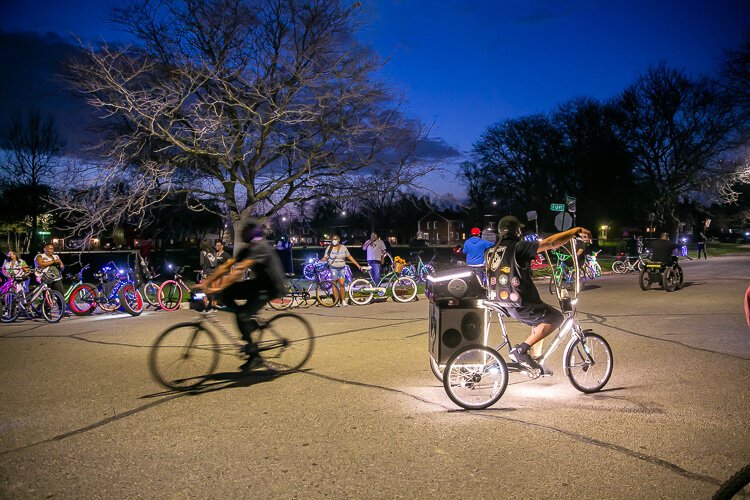
Bike life means community love
A. Bailey had just moved back to Detroit from Columbus, Ohio to be closer to her family in 2016. As she sat on her grandmother’s porch, she saw a large group of bicyclists ride right by her house. She was instantly intrigued by the joy and camaraderie and jumped on social media to learn more.
The Facebook page of Soul Roll, one of Detroit’s biggest and most popular rides, is full of people having fun in the comments as they “like” pictures of riders. But, it was Slow Roll that was Bailey’s first big ride.
“I had never seen that many people coming together, organized on a bike ride together,” she says. One thing that still sticks in her memory is how people in the community would come out on their porches and applaud the riders. “We have had people jump off their porch, jump on the bikes and join the ride. I remember just thinking, ‘Wow. This really brings people together.’”
Bailey, as she is known to her biker friends, says that she was an independent rider who got to know members of the North End Bandits Bike Club who eventually asked her to join their ranks. The 14-member club was founded in 2016, and she was drawn to their passion for activism.
Bailey says that she has always had a passion for community service that she truly tapped into in college when she joined Alpha Kappa Alpha Sorority, Inc. “I’m an introvert who is trying to be an extrovert so that I can serve more people,” she says. “Biking gives me a chance to meet people of all walks of life.” People who love the bike life are from both inside and outside of the city united by their passion for two-wheel riding.
“Collectively bike clubs are promoting a healthy lifestyle to fight diabetes, high blood pressure and obesity through cycling,” she says. “In addition, some clubs go beyond biking and focus on improving the community through volunteerism and ongoing engagement.”
Like the Detroit Lane Bangerz founded by Collier “40” Hardaway. This week, his club organized a ride for kids in the Fitzgerald community who received bikes from the nonprofit, Free Bikes 4 Kids, where he sits on the board.
“To me, the culture of bike life is the unification of communities,” 40 says. “It creates a socialization within it, networking, communications. It’s a bridge in the community, particularly in the Black community — it creates a judgment-free and neutral space for people to talk to one another.”
Todd Scott agrees. His organization, the Detroit Greenways Coalition, focuses on working to engage bicyclists and the city and state to create more free spaces for people to ride their bikes. He, too, agrees with the close-knit nature of bike life culture.
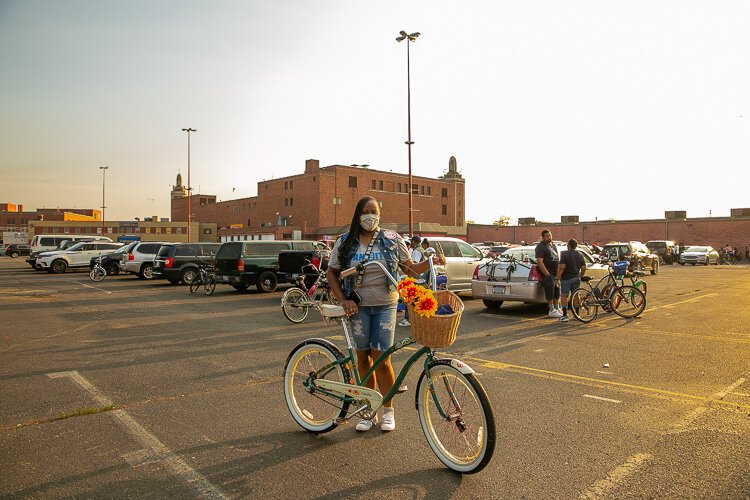
For Scott, he thinks one of the best things about Detroit bike culture is how it brings together people that are really positive, and supportive of one another, too. He says there are certainly times that there are squabbles, as there are in most families. But it’s a very supportive, extended family scenario.
On a recent ride, 40 says that five riders got flat tires and one young rider started to fall behind, but everyone pitched in to help. “We have a policy with bike life, no bike left behind. That means if you catch a flat, I have a flat. We make provisions, we are normally in somebody’s area, or we have even had people come out of nowhere with a pickup truck to get those people back to their cars.”
“We all come together, and we all leave together.”
Scott says that the family feel of bike clubs has been important during the pandemic, “especially when there’s so much tragedy going around within families and people getting ill and passing.”
He adds, “It’s great that people have this additional support system, a support network to help them get through this.”
Let the good times roll again
Slow Roll, which was Bailey’s first foray into the bike life, changed to #SoloRoll during COVID-19 and encouraged participants to ride their bikes, but in a socially distant way. “Ride solo now, so we can slow roll together later,” one biker says in a video created last year.
The bike ride earned national attention when the ride’s co-founder was featured in a national television spot for Apple’s iPad in 2014. Jason Hall has since moved on from the organization and owner of RiDetroit and a partner at Electric Ave. Bikes on Woodward Ave.
The popular ride is one that has yet to return since the unofficial end of the pandemic, as of press time, there isn’t a Slow Roll scheduled for Detroit yet. Bailey doesn’t believe that it will return this summer, because it brings out up to 2,000 riders and that can not be done safely yet.
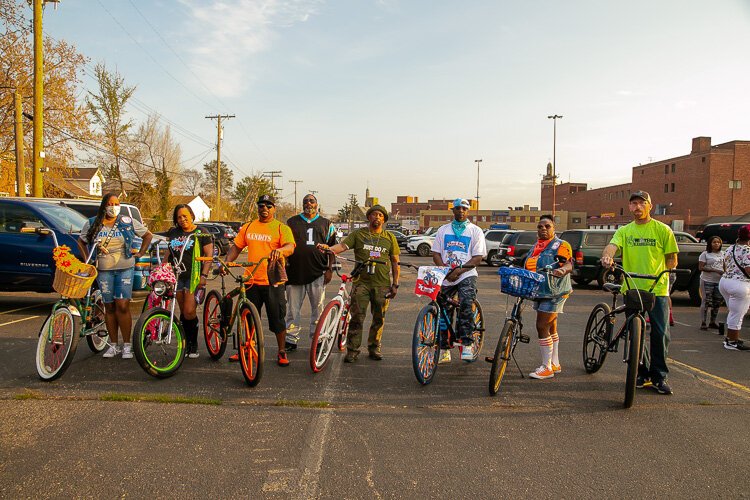
But, last Saturday night 40 joined the D-Town Riders and other clubs on the 23-mile Soul Roll ride. He called it a “beautiful” night with nearly 100 riders in their caravan, with lit-up bikes and music. He says that people are coming back “slowly, but surely,” as they overcome “their fear factor.”
While 40 says that many of his friends and members did regular individual rides last year when there was good weather, “People are so bored and frustrated by having their movement restricted,” he says. “As I encourage people to get out and ride, I haven’t had to twist any arms.”
‘The city looks way different on two wheels than four’
Yesterday morning, Bailey joined members of the Detroit Lane Bangerz at Cooke Elementary School in the Fitzgerald neighborhood to take more than 40 elementary schoolers on a 5-mile ride around their community.
“For many of these kids, they almost never leave their own block,” she says. “Detroit looks way different on a bike than it does in a car.”
“We ride through so many neighborhoods. Some people who join our rides haven’t seen many of these areas because they may be riding in a different part of the city, or in the suburbs. I also get a lot of pride for the city when I’m on a ride. I see places that have improved, and also areas that I would like to see improved.”
She says that bike life has helped her bring out a passion for community that she describes as a “calling.” “I do a lot of service with my sorority, but this has taken me into very different demographics,” she says.
For her and for other bikers, she is excited about the newfound passion that other Detroiters are finding on a bicycle. “It’s fantastic seeing both new and used bikes sell out,” she says, “except when you’re trying to find the one you really want,” she says with a laugh. “Within this last year so many family and friends reached out asking me to help find them a bike. I love it!”
“I’ve never invited someone out and they didn’t keep riding.”
She encourages Detroiters to search Facebook for information on joining clubs or just joining up with a good ride. The Bike Life, Soul Roll Detroit, Westside Wednesday Detroit Rides are some popular pages.
Now is the time to start
The Detroit Greenways Coalition supports bike clubs and bike culture by being actively involved in shaping and promoting what the city does with respect to bike infrastructure. Scott, executive director of Detroit Greenways Coalition, frequently advocates for the building of new facilities and new trails, and making sure that infrastructure is designed for and can accommodate riders.
Scott says that he is excited about the Conner Creek Greenway and the building of the Joe Louis Greenway, which is in phase one of development. He notes that the new infrastructure bill presented to Congress by President Biden may mean new funding for pushing forward more green thoroughfares in the city.
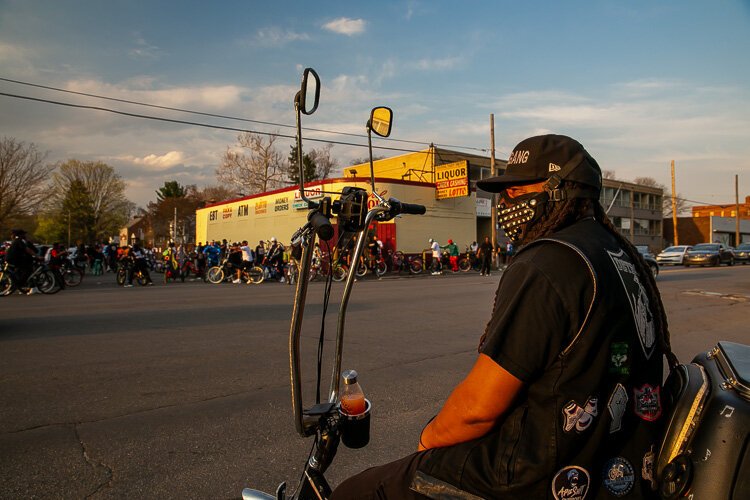
“We’ve seen a 40% increase of trail use in the city since COVID,” Scott says, indicating that bike life is growing.
Jason Hall, owner of Electric Ave. Bikes in downtown, says that bikers kept riding during the pandemic with the early permission of Gov. Gretchen Whitmer, who OK’d outdoor activities in April of 2020.
But, he added, “they would have done so anyway.” Hall compares bike culture to having a similar “renegade” spirit of their predecessors, motorcycle culture. In fact, he says, many of Detroit’s bike club members participate in both.
Having sold out of bikes during the pandemic, Hall says that the challenge now for metro Detroit bike store owners isn’t finding more customers, but the ease of the Chinese supply chain to get new bikes in.
He has a vision for the summer that he shares with his fellow shop owners across the nation. “There was a bike boom in the 1980s, and a lot of people are comparing this one to that one. In fact, they are calling it ‘the bike bike boom boom.’”
He says definitively, “This is going to be a big summer. Not just for bikes, but for everything.”
From his seat on Woodward and MLK Blvd., he has watched the Midtown/Downtown area suddenly perk back up with more traffic and more pedestrians, and yes, more bike riders.
For new riders looking to get into the bike life, Hall is ready to offer advice and suggests coming by his store. “An e-bike is a good way to ease back into the kind of physicality that bike riding requires.” He occasionally offers test rides for new customers, but advises them to bring a friend.
Scott says that most “rides are very inclusive, especially to newcomers, because they don’t travel very fast,” Scott says. “And there’s breaks along the way, if you have questions, people are more than welcome to help get you through the events.” He says that joining a bike club isn’t necessary in the beginning, and riders who do often do so usually through positive experiences and relationships.
40’s advice for the new rider is even more straightforward. “Stop the first person you see on a bike and ask them where they are headed. Bike riders, honestly, we love it. We love encouraging people to join this life. We want to see more people putting down cars and motorcycles and hoping on a bike. So, if you stop someone they will probably point you in the right direction to meet a club or give you some advice.”
